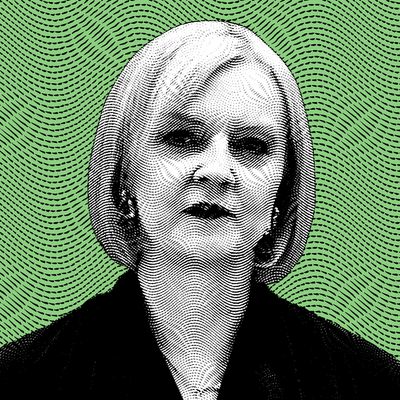
The major stock markets in the U.S. fell again on Monday — not only plumbing new lows for the year but with the Dow Jones closing lower than the pre-pandemic high reached in February 2019. Bad? Yes. But what’s more concerning is what happened some 200 miles south of the New York Stock Exchange at the U.S. Treasury. There, officials held auctions to sell off bonds that pay for the continued operations of the federal government. The price of those bonds helps set everything from credit-card rates to monthly mortgage payments and acts as a proxy for how bad inflation is going to get. The auction made it clear that investors, in the aggregate, don’t think inflation is anywhere near an end.
According to the auction results today, inflation is expected to not only stay high during the next year but likely increase during the next two to three years. As of Monday afternoon, bond investors appear to believe the U.S. annual inflation rate will stay above 4 percent, on average, until 2029. That’s double the Fed’s goal of about 2 percent — something that Wall Street has broadly been assuming was what would happen before too long.
It’s not just the U.S. — bad news has been everywhere in the financial markets lately, almost regardless of the country, the region, or the class of asset. Everything from American stocks, to emerging market currencies, to gold, to oil has been plunging in value. After a tremendous week of global ruptures, the world has downshifted to prepare for a stranger and longer period of economic reordering than what had seemed likely just a month ago. Central banks, governments, and investors alike are trying to figure out how bad inflation will get, whether the world is headed for a nasty recession, and how bad the financial hangover will for all the lavish spending of the pandemic era.
The United Kingdom has been as been among the worst-hit in recent days — and, again, inflation is at the heart of the problem. Last week, the U.K. government announced it was dynamiting its own budget with a series of tax cuts and spending plans to curb the absolutely insane cost of energy there, causing the pound to slip to the lowest point since the 1980s. Then, on Monday morning, things got worse. The currency fell to its lowest level ever against the U.S. dollar — as low as $1.03, down from more than $1.40 just last year — and there seemed to be no real plan to deal with the repercussions. The U.K. economy has been under pressures from rising prices similar to those facing the U.S., though the British situation has been considerably worse because of spiraling energy prices, (Energy bills were forecast to reach 3,500 pounds a year for a typical household.) Prime Minister Liz Truss’s economic plan is a relic of the 1980s, when Margaret Thatcher and Ronald Reagan governed on the promise that government austerity would pay for itself. (A research note from Goldman Sachs, of all places, points out that Reagan’s 1981 tax cuts were later reversed since they did not, in fact, pay for themselves). There were rumors that England’s central bank would come in to balance out Truss’s profligacy with a rise in interest rates, but that turned out to false, a decision that let the pound sink back down to near its lows and affirmed that — in the judgment of bond investors — the U.K. was less trustworthy to pay back its obligations than Italy or Greece.
The U.K. has precious little money in its central bank vaults to defend its currency — recall this was a problem for Russia when the world cut it off from its foreign-currency reserves, preventing it from propping up its own currency after economic sanctions were imposed on it for its invasion of Ukraine. For all of Boris Johnson’s antics, Truss’s predecessor had plans to hike taxes, and her rival for Tory leadership had warned that tax cuts would just further stoke inflation. Now the U.K. population is left with a weaker currency and the likelihood of larger interest payments on the national debt.
Meanwhile, the Eurozone is faring just as badly, with economic and geopolitical turmoil spreading in unpredictable ways. Italy’s election of an unpredictable fascist-sympathizing prime minister, Giorgia Meloni, just makes things wilder. A very Tucker Carlson–like speech by Meloni has been making the rounds on Twitter, but what may be more critical to the future is how she leads a right-wing coalition in negotiating with the European Central Bank, the ultimate authority over Continental finances. Meloni hasn’t campaigned on a Brexit-like break with the rest of the Eurozone, but she could negotiate with Brussels to loosen requirements for funding or push the ECB to buy more of Italy’s bonds than, say, Germany’s — all of which just deepens investor uncertainty (and pessimism) about the state of Europe and the euro (these days, it trades at 96 cents, down from a recent high of $1.25).
And then there’s China. After spending about $1 trillion on its neocolonialist Belt and Road Initiative, where Xi Jinping’s government funds resource mining and infrastructure projects around the world, the country is slowing its expansionary ambitions as the economy there goes sideways. China is in the midst of a housing crisis that’s been about a year in the making, with homeowners refusing to pay their mortgages. Ultimately, this means that the planet’s second-largest economy is cutting off outsiders from its money as it tries to shore up its own finances.
The reality is that, in the span of just a few years, the world has gone from having more money than it knew what to do with to seeing a huge portion of it sucked out of the financial system by central banks, with the Federal Reserve leading the way. What happens under those circumstances, with the global financial system starved for liquidity and inflation still running hot? Stay tuned!






























